![]() Just for fun, here's a look at some of the politically conservative music made back in the era of Baez and Ochs... Oh, sure, everybody likes to look back at the 1960's folk scene and complain about how all the singers were Lefties, and there were no good right-wing folk singers to be heard. But of course there were -- I mean, some singers who were ideologically robust, though whether they were "good" on not probably depends a lot on your own political perspective. Anyway, here are a few albums that tried to present the alternative viewpoint, giving us a chance to look at the other side of the Vietnam War, and of the steady subversion of traditional, God-fearing American values by the hairy hordes of unwashed, flag-burning pinkos.
Just for fun, here's a look at some of the politically conservative music made back in the era of Baez and Ochs... Oh, sure, everybody likes to look back at the 1960's folk scene and complain about how all the singers were Lefties, and there were no good right-wing folk singers to be heard. But of course there were -- I mean, some singers who were ideologically robust, though whether they were "good" on not probably depends a lot on your own political perspective. Anyway, here are a few albums that tried to present the alternative viewpoint, giving us a chance to look at the other side of the Vietnam War, and of the steady subversion of traditional, God-fearing American values by the hairy hordes of unwashed, flag-burning pinkos.
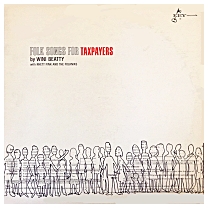 Wini Beatty & Rhett Fink "Folks Songs For Taxpayers" (Key Records, 1966) (LP)
Wini Beatty & Rhett Fink "Folks Songs For Taxpayers" (Key Records, 1966) (LP)
(Produced by Vick Knight & Don Blake)
This is a fascinating historical document, evidence of the ideological roots of California's anti-tax movement about a decade before the grassroots mobilization of the Proposition 13 campaign in 1978. The album is staged as a faux-cabaret performance, with pianist Ms. Wini Beatty singing in front of what sounds like a handful of conservative cohorts, singing politically-slanted parodies of various pop standards and folk tunes, each given a contemporary topical theme, with a sharply right-wing tilt. The "songs" are all pretty short, mostly just a verse or two, with Beatty moving on to a new one after the chorus comes around, just enough to evoke the original song and to get in a barb or two. Some of the lyrics are clever, though most are rather blunt and not nearly the zingers Beatty & Co. think them to be... There are some songs specifically about taxes, and others about the Civil Rights Movement and pinko college students... Many are just plain mean-spirited and hostile, like one attacking Lady Bird Johnson, calling her charitable works a fraud to cover up for her husband's pinko leanings. Indeed, as the record progresses, it becomes clear that this isn't a real intellectual cry from the conservative Right, ala William F. Buckley, but rather an outlet for more reactive far-right groups such as the Birchers. They start fulminating about communism and the Russians, etc. and pointing fingers at liberal politicians, students and activists who are supposedly trying to bring totalitarianism to American shores. It's all very 1950s in perspective, but just when you're ready to laugh it off as an anachronistic relic, you realize that this brand of harsh anti-everybody politics did finally come to full fruition in the "tea party" movement of 2008, et. al. So, it's historically relevant, but it is at its heart an unpleasant record to listen to: the snide, insidious, sneering tone of the performances is mirrored in the forced, vindictive guffawing of the "audience," all of which simply oozes score-keeping, resentment and outright malevolence. It's a record of its times, although perhaps (as is often the case) not exactly the record that it was meant to be.
![]() Anita Bryant "Mine Eyes Have Seen The Glory" (Columbia Records, 1966) (LP)
Anita Bryant "Mine Eyes Have Seen The Glory" (Columbia Records, 1966) (LP)
(Produced by David Rubinson)
The American left, queers and feminists in particular, loathed Anita Bryant for her conservative politics and her strident anti-gay activism, which made her a controversial and polarizing national figure. Still, one of the all-time great political ironies was when Bryant included a version of Phil Ochs' blistering political anthem "Power And Glory" on this otherwise dreary album of patriotic tunes. It's possible that Bryant and her entourage meant the recording to be a poke in the eye to Ochs ("Try and reclaim the patriotic center from us, will you? Hah! Take that!") but most people just assume that having Bryant record this semi-socialist anthem was a mistake, or even a prank on the part of some mischievous A&R man. Still, it is a great song, and this album proves that even a drippy singer like Anita Bryant couldn't ruin it. Plus, Ochs probably got a few good royalty checks out of it -- enough to buy a new guitar, a piano, or maybe even another gold lame suit!
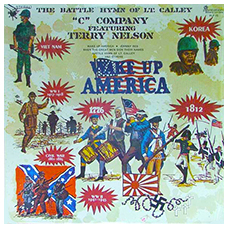 C Company Featuring Terry Nelson "Wake Up America!" (Plantation Records, 1971) (LP)
C Company Featuring Terry Nelson "Wake Up America!" (Plantation Records, 1971) (LP)
(Produced by Shelby Singleton, Clark Bentley & James M. Smith)
Nashville wedged itself into the controversies over the Vietnam War on a number of occasions, perhaps most notably with this patriotic/militaristic album which lauds American soldiers and memorializes our many wars. The album's genesis comes from a very striking novelty song (and unexpected Top 40 hit) called "The Battle Of Lt. Calley," which comes to the defense of Army Lieutenant William Calley, who was courtmartialed and found guilty of murder in the infamous My Lai Massacre of 1968. Terry Nelson was a country deejay from Alabama who voiced the song's recitation, spoken over the melody of the "Battle Hymn Of The Republic." Originally released as a single on a private label, the song became a regional hit and was optioned by producer Shelby Singleton, who re-recorded the track and built this album around it, adding several other songs that delve into America's military psychology. The album came out immediately after Calley's conviction and life sentence, capitalizing on the highly-charged debate over his actions and the atrocities of the My Lai slaughter. Also included are tracks such as "War Baby," "When The Great Men Sign Their Names," "Buffalo Soldiers" and "Til We Bring Our Johnnies Home Again."
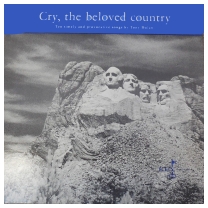 Tony Dolan "Cry, The Beloved Country" (Key Records, 1967) (LP)
Tony Dolan "Cry, The Beloved Country" (Key Records, 1967) (LP)
While many rightwing folkies were explicitly intended as novelty acts, songwriter Tony Dolan was certainly one of the more serious and more intellectually potent of the practitioners... A Yale student when he started his gig, he got the nod from pundit William F. Buckley, who wrote the liner notes to his album, and made the rounds of national TV programs such as the Dick Cavett and Merv Griffin shows... Say what you will about his youthful musical follies, Dolan worked hard and made a lot of powerful connections... He went into journalism, earning a Pulitzer for investigative reporting in the late '70s, and eventually became one of Ronald Reagan's speechwriters, contributing most notably to the "evil Empire" speech which defined the hard edges of Reagan's anticommunist foreign policy. Not bad for a curly-haired kid with a guitar!
Bull Durham "Songs Of SACk"" (Sergeant Major Records, 1964) (LP)
(Produced by William D. Halford)
An entire album of topical songs about the Strategic Air Command? You betcha! And it's country music, too? Yup. A veteran Air Force pilot who flew in both the Korean War and Vietnam, James P. "Bull" Durham (1927-2004) also had a knack for songwriting and performance. He recorded this Cold War classic at Gold Star Studio in Houston, Texas, presumably while stationed in the Lone Star State; the record was commissioned by the Air Force Sergeants Association, in San Antonio. The liner notes tell us that some of the musicians backing him were veterans of WWII and the Korean War, a crew that included banjo player E. V. Buckingham, A.E. Christopher on fiddle and mandolin, bass player Dave Hall, and Tim Woods on drums. Picker Carl Whitley also backed Durham on some of his later recordings, playing both lead guitar and steel. Legend has it that the commander of SAC commissioned both the album and the band, and assigned Durham to tour various Air Force bases as sort of an in-house USO band. Many of the songs are parodies of folk and country oldies, such as "Hang Down Your Boom Ross Cooley" or "Home On The Pad," as well as "The Crew That Never Returned," a send-up of the Kingston Trio's "MTA." Other originals take aim at the Strategic Air Command, or SAC. which was responsible for maintaining America's nuclear first strike capacity, starting with B-52 bombers and spanning into the era of ICBM missiles. Perhaps the album highlight is "No SAC Crew Members Down In Hell," which compliments several other SAC-specific novelty numbers. Born in Kentucky, and stationed all over, Durham settled down in Tennessee in his later years, and recorded at least five full albums.
Bull Durham "Songs Of S.E.A." (Durham Records, 1971) (LP)
(Produced by Skip Wilson)
Narrowing his focus to Southeast Asia, Durham sings his praise for the American armed services active in the Vietnam War, which had gotten pretty darn unpopular by the time this album came out. But Jim Durham had flown in this conflict, too, and had some hard-won songs for the Air Force, as well as praise for the Army, the Army medical corps, helicopter pilots and the military air traffic controllers. Several songs take more of a slice-of-life viewpoint, such as "Saigon Girls" -- about pilots going on leave -- and "DaNang Lullaby," cheerful ditty about artillery shelling, a song described in this jaunty liner note, "If there is anything amusing about a rocket attack it is afterwards when you are back home in the States, and hear a tire blow out, and start looking for a bunker." Ah, the good old days, back when PTSD was still a funny story to tell the kids, and not yet an acronym! Durham is backed by Doc Martin on steel guitar and Carl Whitely playing lead -- a couple fo songs are contributed by David McKay (including a Johnny Cash parody called "I Fly The Line") and two others by a guy named Jack Selden, whose apocalyptic nuclear-war ballad, "The Devil Clapped His Hands," rounds this album out.
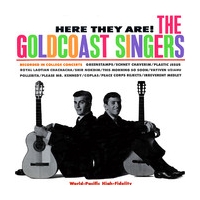 The Goldcoast Singers "Here They Are!" (World Pacific Records, 1962) (LP)
The Goldcoast Singers "Here They Are!" (World Pacific Records, 1962) (LP)
A prescient set of political satire from the Kennedy era, recorded live at the San Francisco State Folk Festival in 1962. This isn't a "right wing" record, per se, but since the Greenwich Village folk scene so quickly coalesced around the New Left, the biting satire of the Ed Rush/George Cromarty duo stands out, particularly its insightful (and pointed) lampooning of the Civil Rights Movement. In one deft, catchy chorus of the uptempo "Peace Corps Rejects," they critique the white, liberal Ivy League college students who became Freedom Riders in the South, as well as the NAACP for putting them in danger, and questioned the effectiveness of civil disobedience as a tactic: "We come on the Greyhound bus/thirty-seven of us/the NAACP paid our fees/put in in jail/don't accept bail/integrated buses will set the South free..." The song reflects an extremely brief moment in time when satirists could poke fun at these campaigns, though events such as the March on Washington and the passage to the 1964 civil rights bill, and the numerous bombings and lynchings that were given national attention soon made the Civil Rights Movement a sacred icon in mainstream, middle America. This record was also remarkable for its early criticism of America's involvement in Viet Nam (at the time still limited to a small number of "advisors" on the ground) with biting songs such as "The Royal Laotian Cha-Cha-Cha" and "Please Mr. Kennedy," which dealt more broadly with the Cold War and the draft. The best-known song on this album is "Plastic Jesus," a cheerful critique of consumerized and hypocritical religiosity and evangelicism. Although they had some of the same level of wit and bite as Phil Ochs, the duo's career was cut short when Cromarty was drafted in '63. He reemerged a decade later with an innovative and influential album of new acoustic music entitled Grassroots Guitar; I'm not sure what Rush went on to do, musically, if anything. [Footnote: the song "Please Mr. Kennedy" was revived -- in altered form -- in the Coen Brothers film, "Inside Lloyd Davis," where is was remade into a calypso-rock novelty number about nuclear war. Admirably, the Coens gave credit to the Goldcoast Singers... as well they should!]
![]() The Goldwaters "...Sing Folk Songs To Bug Liberals" (Greenleaf Records, 1964) (LP)
The Goldwaters "...Sing Folk Songs To Bug Liberals" (Greenleaf Records, 1964) (LP)
A real, live, campaign-year LP recorded as pro-Goldwater propaganda. Plus, as the record says, just to bug liberals. And here it is, fifty years later, and it still works! In much the same way that the Monkees were put together as a prefab pop band, the Goldwaters were created as a faux-folk band solely to promote the Barry Goldwater presidential campaign, and evaporated in a puff of smoke the second he lost... Apparently at one point John D. Loudermilk was signed up as the producer, but left midway through, and at some point the record had to be re-recorded to take out a bunch of anti-Kennedy jokes... Y'know, after Kennedy got killed and all. The magnificently obsessive Conelrad website has an excellent interview with one of the former members of the band, Ken Crook.
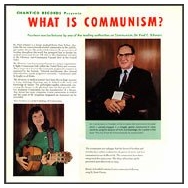 Janet Greene & Dr. Fred C. Schwarz "What Is Communism?" (Chantico Records, 1966) (LP)
Janet Greene & Dr. Fred C. Schwarz "What Is Communism?" (Chantico Records, 1966) (LP)
Singer Janet Greene was the musical mouthpiece of one of the 'Sixties most rabid anticommunists, a lecturer named Fred C. Schwarz who bankrolled a group called the Christian Anti-Communist Crusade and recruited Greene -- an actress working on a children's television show in Ohio -- to set some of his ideas to music. Normally her songs were released on 45rpm singles, but here they are gathered together as one LP side in a 4-LP set, along with fourteen "concise lectures" by Schwartz, detailing how the sneaky Commie rats were plotting to destroy America. It's political camp in its highest form; Greene's songs are also collected on the FREEDOM IS A HAMMER compilation, listed below. By 1967, Greene was ready to move on, and dropped the political stuff from her repertoire, but this is the work she's best remembered for, with kitschy classics such as "Inch By Inch," "Fascist Threat," and "Commie Lies." I mean, really -- how can you go wrong??
 Autry Inman "Ballad Of Two Brothers" (Epic Records, 1968) (LP)
Autry Inman "Ballad Of Two Brothers" (Epic Records, 1968) (LP)
This Vietnam War-era patriotic album contains Inman's biggest hit, Bobby Braddock's "Ballad Of Two Brothers," a topically-themed recitation song, a duet with singer Bob Luman that went to #14 on the charts as a single. It's accompanied here by oldies and standards such as "There's A Star Spangled Banner Waving Somewhere" and "Ballad Of The Green Berets," as well as contemporary songs such as "Stand Up For America," "Must We Fight Two Wars," "Vietnam Blues" and even the social commentary of "Skip A Rope." Strong stuff that tackled a lot of contemporary issues.
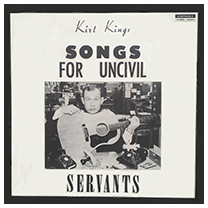 Kirt King "Songs For Uncivil Servants" (Symphonia Recording Company, 1963) (LP)
Kirt King "Songs For Uncivil Servants" (Symphonia Recording Company, 1963) (LP)
This one's a real doozy. This is one of those snide, mean-spirited, hard-right records from Southern California, made by a guy with a real chip on his shoulder. Hailing from San Diego, Mr. King was apparently employed as a juvenile corrections officer for the state of California, and he makes reference to his work on several songs, taking potshots at the bureaucracy and the bureaucrats, including the president of the corrections officer agency ("The CPPCA President") who he accuses of incompetence, arrogance and graft. King is actually pretty clever, sounding a bit like Tom Lehrer, but rather mean-spirited and harsh: the album opens with a vicious screed against premarital sex, birth control, and unwed mothers. "Creep On My Caseload" is a parody of the Everly Brothers oldie, "Bird Dog," in which he basically says how tired he is hearing all these kids whining about their problems, and what they really need is a good smack on the kisser to get them on the right track. Swell guy, right? He also clearly had it in for eggheads and bleeding-heart liberals as well, and reserved special scorn for Governor Pat Brown and the Democratic Party apparatchiks. Oh, Ronnie, where are you when we need you??
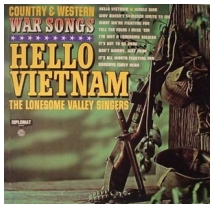 The Lonesome Valley Singers "Hello Vietnam: Country And Western War Songs" (Diplomat Records, 1965) (LP)
The Lonesome Valley Singers "Hello Vietnam: Country And Western War Songs" (Diplomat Records, 1965) (LP)
A vigorous, robust defense of the war in Viet Nam, with a little bit of twang! This cheapie album kicks off with a cover of Tom T. Hall's "Hello Vietnam" and includes even blunter songs with titles such as "Jungle War," "It's Got To Be Done," "What We're Fighting For" and "Don't Worry Just Pray." The Lonesome Valley Singers were one of the anonymous house bands for the budget-line Diplomat label, and recorded numerous records on various themes such as railroads, prison songs, drag racing and at least one other patriotically-themed album, 1966's Men In The Green Berets, listed below. Lord only knows who the pickers were that played in this band!
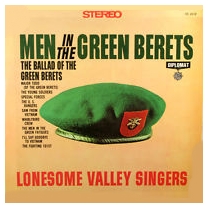 The Lonesome Valley Singers "Men In The Green Berets" (Diplomat Records, 1966) (LP)
The Lonesome Valley Singers "Men In The Green Berets" (Diplomat Records, 1966) (LP)
Piggybacking on the popularity of Sgt. Barry Sadler's Ballads Of The Green Berets, this is another, perhaps less nuanced, pro-Vietnam album packed with songs of macho might and derring-do...
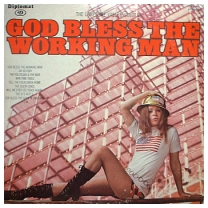 The Lonesome Valley Singers "God Bless The Working Man" (Diplomat Records, 1971-?) (LP)
The Lonesome Valley Singers "God Bless The Working Man" (Diplomat Records, 1971-?) (LP)
This later album is still pro-Vietnam War, but tackles a wider range of themes and presents a richer picture of the American cultural landscape, albeit from the point of view of what what had been dubbed "The Silent Majority" by President Nixon, the un-hippie "squares" who supposedly supported the war. Songs include "God Bless The Boys In Uniform," "The Politician And The War," "P.O.W.," "War Time Taxes" and slightly more forlorn, resigned-yet-hopeful songs such as "Oh Victory" and "Will We Ever See Peace Again." This disc has a conservative tilt, but is a more nuanced, less propagandistic snapshot of early '70s America.
Charlie Moore & Bill Napier "Patriotic Country Music Goes To Viet-Nam" (King Records, 1966) (LP)
The bluegrass duo of Napier & Moore tackle hippie-era political controversy with a set that includes several oldies, tunes such as "Filipino Baby" "A Soldier's Grave" and "When The Roses Bloom Again," as well as more pointed and contemporary material such as "God Please Protect America" and "Is This A Useless War." O, as the label puts it, "red-blooded songs for the true American." Get me some bacon and eggs, Maw, I gotta go defend democracy today!
The Optimists Plus Me "Have A Little Faith And... You'll Never Walk Alone" (Somerset Records, 196-?) (LP)
(Produced by D. L. Miller)
A semi-faux folk album of "anti-protest" music, forcefully idealistic material, with a gospel sentiment bubbling under the surface. This album, which was released in several versions (including a Canadian edition) includes ten tunes, songs such as "It's Gonna Be Okay," "I Believe," "When I've Learned Enough" and "A Man Must Live With Dignity," all billed (on this version) as "Popular And Folk Songs In Protest To The Pessimism Of The 1960s." The anonymous studio group seems to have included songwriter/session man/background singer Joe Babcock, a Nashville insider who wrote "I Washed My Hands In The Muddy Water" and was also in The Nashville Edition, and played piano for Marty Robbins. I'm not sure who else was on this album, but there may have been some overlap with other Alshire/Somerset studio bands such as the California Poppy Pickers, et. al.
The Optimists Plus Me "He... And Other Songs With Soul And Inspiration" (Alshire Records, 196-?) (LP)
(Produced by D. L. Miller)
This is the same material as on the album above, the same ten tracks, and with very similar artwork. Who knows? The Alshire edition probably came out first, but I like the artwork on the other edition.
Bobby Ross "Voice Of America" (Constellation Records, 1988)
(Produced by Dick Bradley, Mike Stidolph & Jeff West)
A Vietnam vet revisits the war over a decade after it ended, with a set of original songs such as "No Home For The Brave (In The Land Of The Free)," "Saigon State Of Mind," and "Finally Welcomed Home." Many are rueful songs about the tough time many vets had coming back to the States, where turmoil at home and their own disillusionment made their reentry into civilian life particularly jarring. Mr. Ross booked an all-star session, with heavyweight pickers such as Bela Fleck, Sonny Garrish, Brent Rowan and Willie Rainsford, and some interesting backing vocalists, including future Top Forty star Billy Dean and Dolly's little sister, Stella Parton. The album is dedicated to a rifle platoon in the 101st Airborne Division, which presumably Bobby Ross served in.
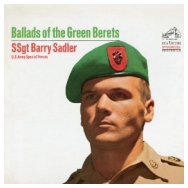 SSgt. Barry Sadler "Ballads Of The Green Berets" (RCA-Victor, 1966) (LP)
SSgt. Barry Sadler "Ballads Of The Green Berets" (RCA-Victor, 1966) (LP)
This was probably the most prominent mainstream album to stand in contrast to the leftwing politics of the hippie-era music business, an LP that circulated in cut-out bins for decades to come, but obviously sold well when it came out. The title track was a big hit on both the Pop and Country charts in '66, vaulting Staff Sargeant Barry Sadler, a member of the Special Forces, into the national spotlight as a bona fide media star. Neither his vocals or the musical accompaniment are anything to write home about, but the songs actually stand up well, particularly those that give a sympathetic, ground-eye view of one of the most dismal wars in American history. Even though this is clearly a propaganda album, it still reflects the ordinary soldier's point of view, and sympathetic portrayals were hard to come by, particularly in film and TV, where the romantic halo of war had been rubbed off years ago when Korean War proved to be unpopular in the heartland, and rock-'em, sock'em war stories seemed less entertaining or inspirational than they once had. To many, the Vietnam War was like Korea's pesky kid brother, and Hollywood wouldn't really tackle it seriously until the '70s and '80s with unflattering films such as The Deerslayer and Platoon. So for folks who want to give Vietnam vets their propers as red-blooded, all-American soldiers, Barry Sadler's flag-draped hit album represents the final, brief moment when such celebration was still possible.
![]() Barry Sadler "Back Home" (RCA, 1967) (LP)
Barry Sadler "Back Home" (RCA, 1967) (LP)
(Produced by Andy Wiswell, Sid Feller & Ed Begley)
Sadler's third album was his last, after the patriotic fervor of his initial pro-war hits died down, and the public perceptions of how the Vietnam War was going got darker and less enthusiastic. Fittingly, this album was an attempt to move on from wartime into the civilian world and, presumably, to confirm Sadler as an established pop singer, outside of his novelty status. The opening number, "One Day Closer To Home" and the title track, "Back Home" explicitly speak to returning veterans, while "Outside Values" was a somewhat muddled topical tune about respecting differences of opinion (while also judging "a man" by his character and his actions, not by his paycheck or fancy college diploma...) The other songs fit the liner note description of "love themes in a country mood," although with Sid Feller's poppy arrangements and the New York studio crew's staid backing, there wasn't really that much twang to be heard on here, outside of a silly attempt to sound like Marty Robbins on "I Walk Alone," with an out-of-control Spanish guitar accompaniment that would make Don Winters blush. Indeed, this disc had a couple of things going against it, apart from Sadler's reputation as a diehard flag-waving super-square... First there was his voice, which frankly was underwhelming -- sort of a poor man's Gene Pitney -- as well as the lackluster pop arrangements and mild rock flavoring, which was a throwback to the early '60s, pre-Beatles teenpop of the Brill Building era... It just wasn't gonna cut it in the world of Sgt. Pepper and Buffalo Springfield. Still, fans of 'Sixties pop-vocals and easy listening/lounge music might get a kick out of this one... Sadler went on to try his hand at acting (unsuccessfully) and found a niche writing pulp fiction... His life took a more-than-tragic turn, though, after he moved to Latin America, and was shot in the head while living in Guatemala. This injury led to long-term hospitalization and paralysis, with Sadler dying in a VA hospital at the end of the decade. Yeesh.
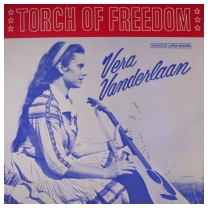 Vera Vanderlaan "Torch Of Freedom" (Vanco Records, 1968) (LP)
Vera Vanderlaan "Torch Of Freedom" (Vanco Records, 1968) (LP)
Despite their suspiciously-foreign sounding last name, Vera Vanderlaan and her husband William were apparently true, red-blooded Americans, New England dairy farmers who heard the call of freedom in the dark days of the 'Sixties countercultural onslaught, and became early shock troops in the American "culture wars." In 1967, they self-produced their first record, America Awake, and spent the next three years on the road as one of a handful of viable right-wing folk acts... As with Ms. Greene, the Vanderlaans mostly put out 45rpm singles, though they did get out this LP in '68, and the songs are collected on the HAMMER OF FREEDOM album, below...
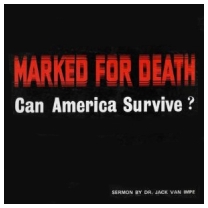 Rev. Jack Van Impe "Marked For Death: Can America Survive?" (Artists Records, 1970) (LP)
Rev. Jack Van Impe "Marked For Death: Can America Survive?" (Artists Records, 1970) (LP)
No music on this one, but I just had to mention it. This is one of my all-time favorite albums, a cherished possession, and an ultra-classic of hysteric, over-the-top, rabidly paranoid, apocalyptic conservatism, with Michigan-based evangelical TV preacher Jack Van Impe holding forth on hippie sex orgies, drugs and rock'n'roll, on the impending sabotage of America by the fearsome SDS (the by then nearly-defunct far-left Students For A Democratic Society) as well as the nuclear war that will bring forth the Apocalypse as prophesized in the Book of Revelations. Whoo-hoo!! Apparently mixmaster DJ Shadow sampled part of this album on a track somewhere... and it is certainly a goldmine for hot samples: I used to play it on my radio show from time to time, particularly the part where he raves about rock'n'roll:
...and that's just him getting warmed up. Great record. You can hear it online at the Recordo Obscura blog, if you dare. I bet his other albums are a real hoot as well. (NOTE: some sites list this as having come out in 1972, but I think that's incorrect. Van Impe makes several references that make it clear that these sermons were made in the summer of 1969, and I doubt he wasted much time getting it out, what with the immediate crisis and "sudden destruction" looming at the time. The references to '72 were part of his prophecy, not a marker of when he made this record.)
![]() Rev. Jack Van Impe "The Coming War With Russia" (Jack Van Impe Ministries, 196-) (LP)
Rev. Jack Van Impe "The Coming War With Russia" (Jack Van Impe Ministries, 196-) (LP)
Anyone know when this one came out? Some sites say '73, but it seems like it must have been much earlier... Anyway, although he's since transferred his apocalyptic projections onto China, Van Impe periodically revives his hopes for an America-vs.-Russia slugfest, so I suppose this album will always have a timely element, at least as far as Reverend Jack is concerned...
 John Wayne "America, Why I Love Her" (RCA-Victor, 1973)
John Wayne "America, Why I Love Her" (RCA-Victor, 1973)
A delicious patriotic kitsch classic. Wayne doesn't attack lefties, except by inference, his virile, shining love of America and American values such a beacon that their pallid pinko preferences wilt in comparison. The recitations are the best, particularly the title piece, "America, Why I Love Her." I'm also fond of "Why Are You Marching, Son?"
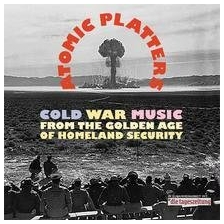 Various Artists "ATOMIC PLATTERS: COLD WAR MUSIC FROM THE GOLDEN AGE OF HOMELAND SECURITY" (Bear Family Records, 2006)
Various Artists "ATOMIC PLATTERS: COLD WAR MUSIC FROM THE GOLDEN AGE OF HOMELAND SECURITY" (Bear Family Records, 2006)
The German archival label, Bear Family, turns its attention to the defining historical conflict of the late 20th Century, with this stunning 5-CD, 1-DVD omnibus of Cold War propaganda and kitsch, ranging from duck-and-cover civil defense PSAs and snippets of news broadcasts to a hefty helping of conservative musical acts, including several of the artists listed here, and novelty tunes galore. Country, rock, pop, jazz and blues, and everybody's wondering when the Big One's gonna drop. This collection was curated by the same folks who put together the more compact FREEDOM IS A HAMMER album, below.
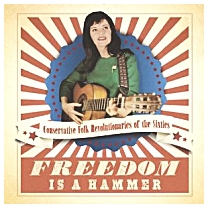 Various Artists "FREEDOM IS A HAMMER: CONSERVATIVE FOLK REVOLUTIONARIES OF THE SIXTIES" (Omni Recording Corporation, 2012)
Various Artists "FREEDOM IS A HAMMER: CONSERVATIVE FOLK REVOLUTIONARIES OF THE SIXTIES" (Omni Recording Corporation, 2012)
This single-CD collection gathers music from several of the artists listed above, Janet Greene, Tony Dolan, and Vera Vanderlaan... This is probably the easiest way to explore these artists' legacies, other than YouTube, I suppose.
 Various Artists "IN COUNTRY: FOLK SONGS OF AMERICANS IN THE VIETNAM WAR" (Rounder/Flying Fish Records, 1991)
Various Artists "IN COUNTRY: FOLK SONGS OF AMERICANS IN THE VIETNAM WAR" (Rounder/Flying Fish Records, 1991)
The music that came out of the Vietnam War was not, as you might imagine, all from a conservative perspective. A lot of servicemen and veterans wrote bitter protest songs, though that in itself is another form of patriotism. This collection includes music by several veterans of the war, including 'Seventies folkie Saul Brody, as well as James P. ("Bull") Durham, Dick Jonas, Chuck Rosenberg, and others. The lyrics combine patriotism and complaint in a way that would have made Bill Mauldin proud... The album came out of an earlier project, a 1989 concert that was broadcast on PBS
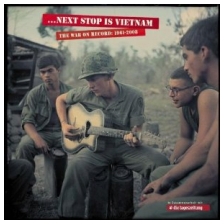 Various Artists "NEXT STOP IS VIETNAM -- THE WAR ON RECORD: 1961-2008" (Bear Family Records, 2010)
Various Artists "NEXT STOP IS VIETNAM -- THE WAR ON RECORD: 1961-2008" (Bear Family Records, 2010)
If you thought Bear Family's Cold War box set was massive, then check out this 13-CD monolith, which mixes music and spoken word to cover the arc of changing public opinion about American involvement in Viet Nam, back from the days when it was still called Indochina to the evacuation of the US embassy and beyond. It's a pretty impressive historical tour de force, with hundreds of tracks, including a lot of really rare and obscure material. Some of the most interesting stuff, I think, comes from the early '60s, when you still had people writing songs that treated the war like earlier conflicts, lamenting boyfriends or sons who had shipped out to nobly fight on some foreign shore... Of course, there's also plenty of antiwar material as well, from folkies like Phil Ochs, Pete Seeger and rock and pop musicians as well, not the least of which includes Country Joe McDonald, who wrote the song that gave this collection its title, and who contributes liner notes as well. I'm glad they also included some of his post-war recordings as well, as McDonald proved to be a more nuanced critic than many might have thought, shifting his activism in the late '70s from simply opposing the war to supporting the returning veterans and publicizing the health hazards of Agent Orange and other chemicals used by American soldiers. This collection is probably too much of a bummer for many casual listeners, but I can't imagine there are too many university poli-sci and history departments that wouldn't wand a copy in their library. And it's five, six, seven, open up the pearly gates...
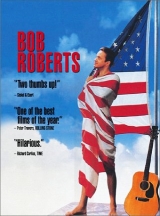 "Bob Roberts"
"Bob Roberts"
(Lions Gate, 1992)
Pity they never came out with a soundtrack for the film Bob Roberts, which featured actor Tim Robbins playing a Tony Dolan-esque folksinger who goes into politics and proves himself more unscrupulous than thou... The character was in essence a lampoon of a lampoon, but not surprisingly may have had more resonance than the music it was making fun of... A nice, cynical farce.
Other Folk'n'Country: By Genre

